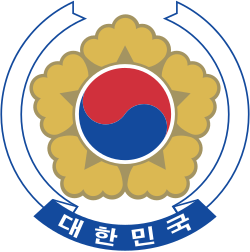This article needs additional citations for verification .(February 2021) |
| This article is part of a series on |
 |
|---|
The 2021 South Korean by-elections were held in South Korea on 7 April 2021. [1] The National Election Commission announced on 2 March 2021, that the by-elections would be held for 21 public offices or electoral districts, including 2 Metropolitan mayors, 2 Municipal mayors, 8 Metropolitan Council constituencies, and 9 Municipal Council constituencies. [1] Candidate registration ran from 18 to 19 March, and the list of candidates was confirmed on 26 March. [2]
Contents
- Reasons for by-elections
- Metropolitan mayors and governors
- Municipal mayors
- Members of Metropolitan Council
- Members of Municipal Council
- Issues
- Amendment of Democratic Party's constitution
- Resignation of Yoon Suk-yeol
- LH scandal
- Mayor of Seoul
- Background
- Registered candidates
- Primary and Nomination
- Debates
- Polling
- Exit poll
- Results
- Mayor of Busan
- Primary
- List of registered candidates
- Results 2
- Municipal Mayor
- Mayor of Nam District, Ulsan
- Mayor of Uiryeong County
- Member of Metropolitan Council
- Seoul Metropolitan Council
- Gyeonggi Metropolitan Council
- North Chungcheong Metropolitan Council
- South Jeolla Metropolitan Council
- South Gyeongsang Metropolitan Council
- Member of Municipal Council
- Seoul
- Ulsan
- Gyeonggi
- South Chungcheong
- North Jeolla
- South Jeolla
- South Gyeongsang
- References
Voters in the by-elections were able to access early voting from 06:00–18:00 KST on 2 and 3 April. [2] One early voting place was established for each district or county of the region where the re-election was conducted, and voters could vote at any pre-voting place in the district where the re-election was conducted, regardless of their address. [2] But on election day, voters had to vote at their designated polling place, and the voting time was from 6 a.m. to 8 pm. [2]
The election concluded with the mayors of Seoul and Busan, which are the largest city and the second-largest city in South Korea, respectively, being selected via by-election. [3] The two major political parties, the Democratic Party and the People Power Party, were concentrating on these by-elections, as they believed that the outcome would have a great impact on the 2022 presidential election. [3] The Democratic Party's candidate Park Young-sun, endorsed by Kim Jinai (Open Democratic Party) and Cho Jung-hun (Transition Korea), became the unity candidate of the ruling coalition. [4] For the opposition, the People Power Party's Oh Se-hoon became the unity candidate, endorsed by Ahn Cheol-soo (People Party) and Keum Tae-seop (Independent). [5]





















